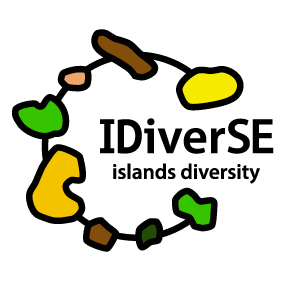
Δείτε εδώ την δραστηριότητα στα Ελληνικά  / Veja a atividade em Português
/ Veja a atividade em Português 
Project Presentation
The “Students Study Volcanoes” accelerator focuses on the study of a physical phenomenon with great societal impact and proposes pedagogical practices based on inquiry‐based methods that are more effective in science education. The objective of this combination is on one hand to increase children’s and student’s interest in science, on how science is made and how it affects everyday life, and on the other to stimulate teacher motivation on up‐taking innovative teaching methods, subjects and practices to enrich and renew the science curriculum.
This accelerator aims to shed light in the mechanisms of volcano eruption, provide students and schools with educational scenarios employing state of the art simulations and remote labs which can be used to help forecast the possibility of a volcanic eruption and finally provide students with the means and methodology to raise awareness regarding volcanic dangers. This way, the students are trained to become sensitive and informed citizens, responsive to the needs of their local community, who will be able to understand and in the future manage crises in a consistent and minimum-risk fashion.
Information for the teacher:
This accelerator was created in the framework of the project - IDiverSE (Islands Diversity for Science Education - 2017-1-PT01-KA201-035919), co-financed by the Erasmus+ agency of the European Union).

Teachers are invited to explore it, copy it and edit whatever they feel necessary before they share it with their students. Specific guidelines were added to the four phases, where teachers can read the full content of the accelerator.
You can find more information as well as translation of this project to other languages through this link: https://idiverse.eu/students-study-volcanoes/
RRI Principles
One of the key aspects of OSOS is the inclusion of RRI - Responsible Research and Innovation - principles (more information at RRI-Tools.eu). This is how this accelerator fits in the RRI model:
|
Governance |
Students will be able to share their activities and conclusions with different stakeholders at local, regional and national level using |
|
Public engagement |
Different stakeholders will participate throughout the project in order to enrich the results obtained in their development. In addition, students will be in contact with other OSOS Schools Participants, creating a network to exchange content around volcanology. |
|
Gender Equality
|
Natural disasters such as volcanic eruptions affect everybody equally, regardless of gender. I.e.: Both genders will be equally represented throughout the project and students will investigate the effect volcanoes have on both women and men of the areas affected by volcanic eruptions. |
|
Science Education |
Students can develop changes and proposals to scientific policies around volcano monitoring, working on a series of conclusions that will have scientific value and can be used in the future. They will also work on real seismic data from volcanic areas such as Azores, which will help them understanding the problem.
I.e.: students, in collaboration with stakeholders involved in this Accelerator, will be able to work through the scientific method to know more about volcanoes, their consequences and the problems they pose for the society. |
|
Ethics |
Students will know how to manage real data and will be able to know the importance of working and experimenting with this type of information, reflecting on the need to provide full mechanisms for scientific research.
I.e.: when working with real volcanic data, students will value the integrity of these data and the importance of being responsible for its use, as well as for the conclusions and results extracted. |
|
Open Access |
Society in territories nearby a volcano need to live with constant fear of an eruption modify their lives around this reality, many times working with scientists in community based science projects to help prepare for a potential disaster. On the other hand, people who have no active volcanoes in their vicinity are not aware of the constant struggle of the first category of people and their constant danger and struggle. This Accelerator plays a very important role in disseminating intermediate results and conclusions to the public in order to: raise awareness, notify people away from volcanoes for the needs of those in constant danger and facilitate the possibility to contribute either by volunteering, or by sending food and other resources necessary. Students will be able to elaborate these materials and share them openly, and completely free of charge, to all those sectors that may be interested (such as general public, families as well as local, regional and national stakeholders).
I.e.: during this project, students can begin to raise what issues may be interesting to disseminate among the environment in order to, at the end of the activity, create the materials to disseminate, for example through leaflets or through the Internet. |
Students age group: 9 - 12, 12 - 15, 15 - 18, 18 - 25
Subject domain: Environmental Education, Geography and Earth Science, Physics
# of students participating: 50
Updated on: 17.01.2020
 Login
Login






Comments
In order to be able to post a comment you have to be logged in to the portal. You can login or register a new account by pressing the "Login" button at the top right corner.